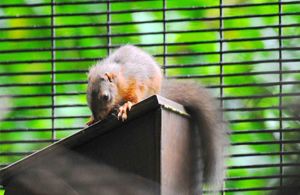Baby red squirrels born on Ballykinler Training Area
The Defence Infrastructure Organisation has welcomed red squirrels onto the Ballykinler Training Area as part of a programme with Belfast Zoo, the Northern Ireland Environment Agency and Northern Ireland Squirrel Forum to increase their population in Northern Ireland.

Belfast Zoo has been breeding red squirrels since 2012 and have to date released 30 reds into the wild. Copyright Belfast Zoo 2020.
Red squirrels have struggled to populate in Northern Ireland due to grey squirrels forcing them out of their home territory. In April 2015, Defence Infrastructure Organisation (DIO) was approached by Northern Ireland Environment Agency (NIEA), Belfast Zoo and Northern Ireland Squirrel Forum (NISF) to support the re-introduction of red squirrels through a special breeding programme.
Ballykinler Training Area was used as there are no grey squirrels or pine martens on site allowing the red squirrels to safely acclimatise to the outside world and develop survival skills before widening their horizons into other forests across Northern Ireland. Staff at DIO set up a nursery area, feeding and water stations, nesting boxes and cameras to monitor the squirrels.
The squirrel kittens were initially placed in a soft release pen with a safe access to allow them to acclimatise to their new environment. They were then released into managed wild habitats within the site’s training grounds after a week to allow them to take their first steps into the outside world and adjust to life in the wild in a safe and secure environment.
Tony Canniford, DIO’s Senior Training Safety Officer for Ballykinler Training Centre said:
DIO plays a vital role in protecting and increasing the population of red squirrels in Northern Ireland and it’s great to see the first set of new-born baby squirrels venturing out into the wild into managed wild habitats within the site’s training grounds. Ballykinler is a diverse site offering the ideal location and environment for red squirrels to breed and adapt to the outside world.
Alyn Cairns, Zoo Manager from Belfast Zoo said:
We are delighted that red squirrels released into Ballykinler as part of a breeding programme have now produced kittens. This is a successful step forward in ensuring the conservation of this iconic native species and we hope the population will continue to grow in future.
Belfast Zoo has worked with DIO and a range of partners in the Northern Ireland Squirrel Forum since 2015 and to date we have released 30 red squirrels into the wild. Ballykinler is one of six sites in Northern Ireland where Belfast Zoo-born red squirrels have been released.
To be part of such a passionate conservation-focused programme is a huge honour for Belfast Zoo. Belfast Zoo cares for some of the world’s most endangered species that are facing increasing threats in their natural habitats and it’s vital that we play a leading role in protecting Northern Ireland’s very own wildlife on our own doorstep.
Dr Declan Looney, Senior Wildlife Inspector with the Northern Ireland Environment Agency and NISF Chair said:
This is an exciting development in the battle to conserve our native red squirrels. Ballykinler has provided a unique closed environment in which to release and monitor this species.
We have worked with Belfast Zoo and other partners in the Northern Ireland Squirrel Forum to use a combination of both captive bred and wild caught animals to expand the species habitat range across Northern Ireland. The staff at Ballykinler have done a great job in maintaining feeders and ensuring the young kits have the best possible environment in which to develop their survival skills.
The squirrels will spend a year getting accustomed to the environment, before being re-captured and released into the woodlands of Northern Ireland. It is hoped that they will thrive with further successful breeding and build up a robust red squirrel population throughout Northern Ireland.